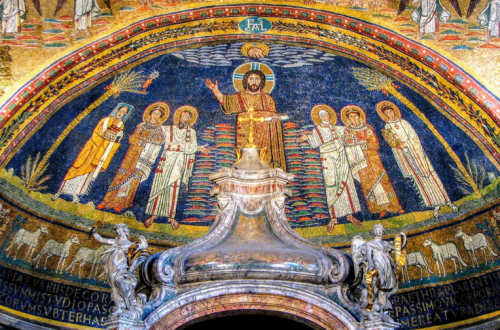
Scouting out the Leadership Gospel
Getting through the gauntlet of Girl Scouts outside the grocery store is a challenge for folks like me who don’t want to drop five bucks on some Lemon-Ups®. Candidly, I only spent a year with the Scouts and never became a top cookie seller. But don’t worry, I earned plenty of patches selling something else: the leadership gospel.
Like others in the seeker-sensitive and Charismatic mega-church movements, I was enamored by the alluring vision, inspirational messages, and organizational expertise of visionary leaders. Since leaving the troop, I’ve watched the leadership gospel become the standard way of doing church and being Christian. As a result, increasing number of nones sniff out the sloganeering and leave. Countless folks cry, “There’s gotta be more than this.” And unfit pastors remain in pulpits because they can sell Samoas®.
O church, we must reclaim the true Gospel! Are you in?
First, let’s establish that leadership is a biblical concept. Both Old and New Testaments show God gifting and calling men and women to lead. But, the leadership gospel reduces the full Gospel into a singular concept of leadership; it exchanges biblical truths about salvation and sanctification for leadership mantras and methods, thus becoming heterodox teaching that teeters on heresy. Consider these clever clichés:
You were saved to serve.
The phrase has achieved John 3.16 status, forming the basis of numerous teachings, some of which distort Scripture by saying that serving is our gift to God in return for his salvation and a way to secure rewards in heaven. Many churches call everyone who serves “a leader.” The pointed vocabulary is used to build a leadership culture that gets spectators out of stadium seats and onto volunteer teams. But, the issue is more than semantics.
Serving the Lord is an outcome of salvation, but a secondary one in comparison to God’s ultimate goal of “beatific vision, perfect unity, and cooperative participation in the life of God.”[1] There’s danger in elevating human ability and excluding the broader biblical witness that says God saved to (amongst other things)…
release us from Sin’s power
mature, transform, and conform us to the fullness of Christ
end the estrangement between God and humanity caused by original sin
The local church is the hope of the world.
The once-lauded Bill Hybels reasoned that if the Gospel is the power of God for salvation (and it is), and if the local church has that Gospel message (and it does), then the local church is the hope of the world and the role of pastors is to equip, empower, and deploy people to maximize potential.
This teaching of Hybels helped reconstruct the local church as a leadership factory run by pastors working to “maximize potential” and achieve great numbers rather than preserve sound doctrine and protect the flock. The church assumes an impossible and idolatrous stance in trying to be the hope of the world. That hope rests in Christ alone.
The leadership gospel orients our faith exactly where the flesh wants it: on the self. We need to be delivered from such delusions, not led further into them by grand narratives about leadership ability. The fixation on leadership, especially at the expense of the other gifts—and fruit—of the Spirit, has created an epidemic of carnality in the church. There’s chronic spiritual and emotional immaturity, as evidenced by the anxiety, sexual immorality, selfish ambition, competition. And, there’s a consistent portrayal of Jesus as some Jewish Jedi of leadership, which makes the process of being sanctified—of being conformed to Christ—nothing more than the mastery of leadership skills.
Jesus was all about self-development; he constantly slipped away to be with the Father.
As if in Gethsemane when overwrought with anguish, or in the wilderness when starvation weakened cognition, the Son of Man sought the Father for an improvement of soft skills.
Jesus was “all about” the relationship with his Father and Spirit, which solitude and silence provided a context for. He was “all about” sharing in the vibrant life of the triune God, unburdening his soul, and surrendering his will in the mysterious intermingling of human with divine that is called prayer. The Gospel invites the church into this same mysterious communion.
Jesus was laser-focused on developing other leaders.
It’s clever how the leadership gospel redefines the biblical concept of discipleship as leadership development. The shepherding of Christ is depicted as mechanical, managerial. Many leaders model their ministries by the 3-12-masses principle: the idea that Jesus poured himself into 3 disciples, placed 12 in middle-management, and held the crowds at a distance.
Sure, Peter, James, and John were with Jesus the longest; they saw his glorious moments and darkest hours. But Scripture is surprisingly quiet on why Jesus chose the three. What’s more, Scripture continually depicts Jesus ministering among the masses.
What a contradiction to the pastors keeping their social distance, hanging out in green rooms, meeting only with A-Listers, despising the trench nature of ministry, covering their pain with inflated egos, and “using the intellect as a protection against the body and emotions.”[2] It’s what the psychiatrist and pioneer of pastoral counseling Frank Lake called “the schizoid problem,” and it keeps pastors detached…untouchable…and thus, a type of anti-Christ.
Make no mistake; the Son of God did not leave the holiness of heaven, shrink himself into human skin, endure torment, experience trauma, and hang billboarded to a bloody stake to make leaders. He came
to end the tyranny of Evil so those who believe could live as God intends
to destroy the one who has the power of death
to reconcile us to the Father
to bear witness to the truth
to seek and save the lost
to reveal God’s glory
That is the Gospel. God was in Christ reconciling this sin-soaked world to himself. That is the Gospel, and it must be protected, preserved, and proclaimed. Are you in?
[1] A conversation with Father Bryan Biba, ordained Anglican Priest
[2] Kenneth Leech Soul Friend: Spiritual Direction in the Modern World (Harrisburg: Moorehouse Publishing, 2001), 107.





One Comment
Connie
Dear one, I was there 18 years. You speak for a growing multitude.
Keep speaking.
Eyes be opened.